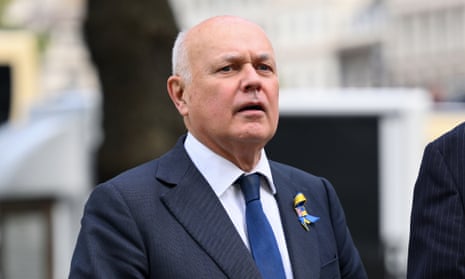The director of public prosecutions is appealing to the supreme court in an ongoing and expensive battle to overturn the acquittal of two protesters found to have acted reasonably in calling Iain Duncan Smith “Tory scum”.
The unusual move will add to the cost to the public purse of a case that Lord Justice Popplewell, who heard the case at the high court, has said has already taken up “significant and substantial legal resources”.
The Crown Prosecution Service declined to say how much the case had cost the taxpayer. A spokesperson said: “We have a duty to ensure that that we understand the reasoning of a court so that we can correctly apply any considerations to future cases and charging decisions. This appeal was pursued because what is required, for all concerned, is clarity and certainty.”
Ruth Wood, 52, and Radical Haslam, 30, were found not guilty in November 2022 of using threatening, abusive or insulting words or behaviour with intent after a two-day trial in Manchester magistrates court.
They had been outside the Midland hotel in Manchester, where the Conservative party annual conference was taking place in October 2021, when Duncan Smith, a former Tory party leader, emerged to walk to the Mercure hotel for a conference about Brexit. He was accompanied by his wife, Betsy Duncan Smith, and her friend Primrose Yorke.
As Duncan Smith crossed the road, an individual ran up behind him and placed a traffic cone on his head. The former cabinet minister removed the cone, called the protesters “pathetic” and continued on his way.
Haslam and Wood, who were not involved in the traffic cone incident, had followed Duncan Smith from a short distance. They separately called him “Tory scum”. Wood added: “Fuck off out of Manchester.”
Wood had successfully defended her comments on the grounds that her job working with homeless people in her local community meant she felt very strongly about the impact Conservative party policies were having on people’s lives. Duncan Smith was the work and pensions secretary from 2010 to 2016.
Haslam’s comments were made in a speech in which he cited child poverty, homelessness and a lack of action over the climate emergency as reasons “why people hate you, why people call you scum”. He added: “It doesn’t come out of nowhere. It comes from what you have done to ordinary people’s lives … shame on you, Tory scum.”
In clearing the two protesters, Judge Goldspring, who is also described as the chief magistrate, had noted that “the use of Tory scum was to highlight the policies” of Duncan Smith and that this was relevant to the “reasonableness of the conduct” in relation to the rights of freedom of expression and assembly.
Goldspring added: “The use of those words did not amount to an offence, as in the circumstances it was reasonable.”
after newsletter promotion
The DPP had sought a judicial review of that ruling at the high court but Popplewell and Mr Justice Fordham ruled last November that there was no fault in law.
The director of public prosecutions, Stephen Parkinson, who has previously criticised Keir Starmer’s record in the role between 2008 and 2013, has now sought leave to appeal to the supreme court.
In response, Popplewell said it was up to the supreme court whether it would consider the point in law on which the DPP is seeking to appeal against the acquittals. He agreed to a stay of execution on the DPP paying £40,000 worth of costs due to the defence lawyers that would otherwise be covered by legal aid. He criticised the prosecution’s position, however, as involving “fluidity”.
The DPP is arguing on a technicality that the chief magistrate was wrong in law to consider the proportionality of convicting the two protesters for their comments. They argue that instead, the courts should have “taken into account” the defendants’ right to freedom of expression and “taken into account” the potential justifications for interfering with that right set out in article 10(2) and then asked whether the defendants’ conduct was reasonable.
